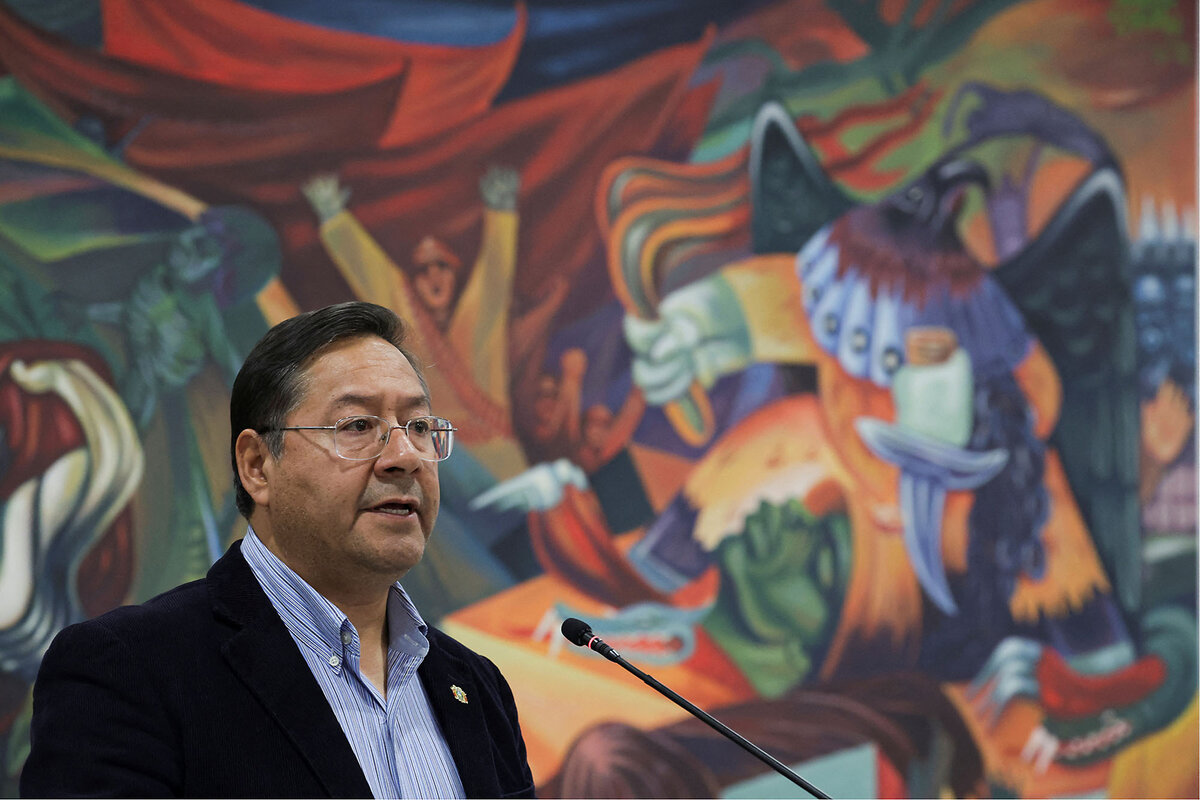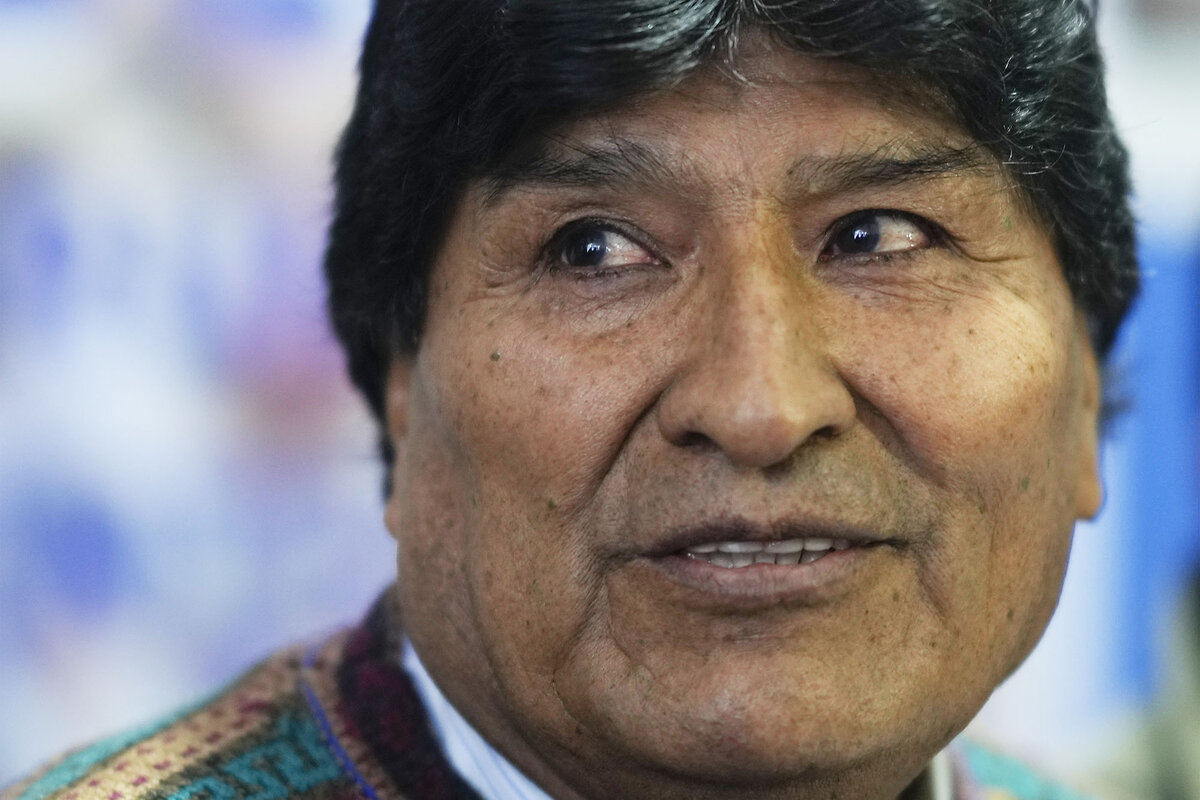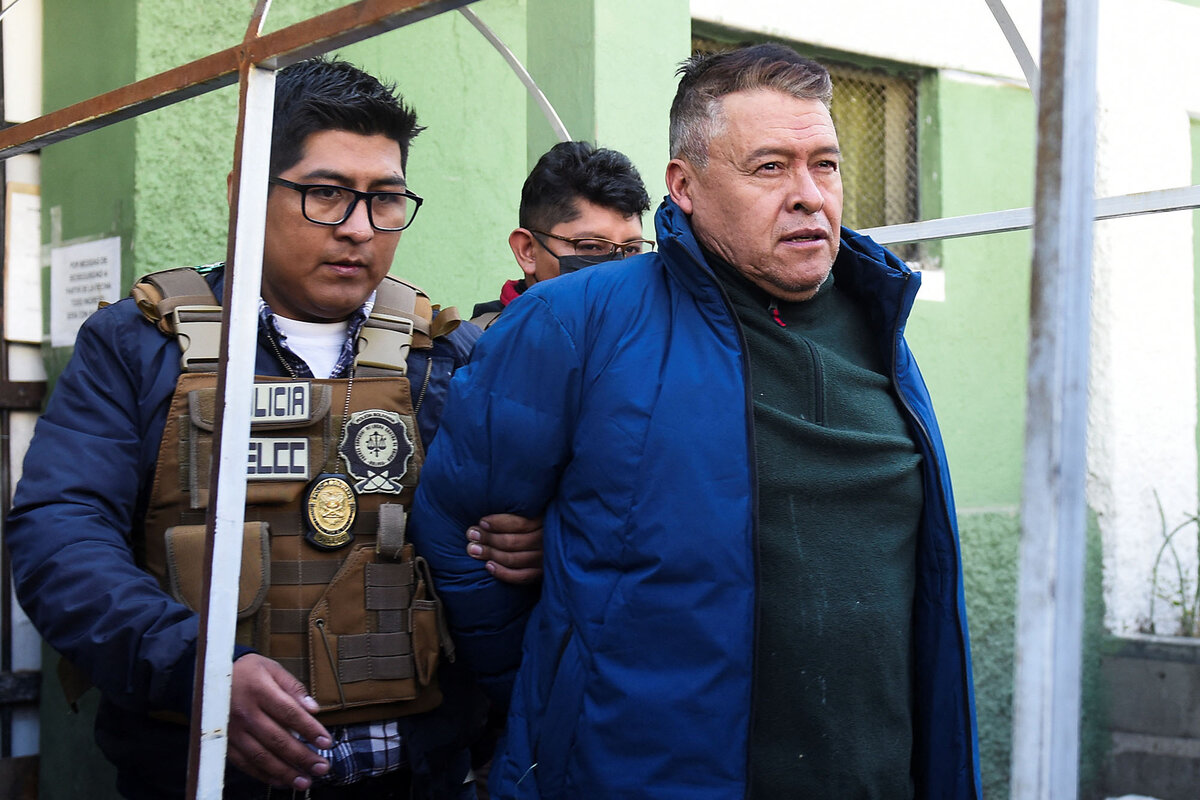In Latin America, armies stage comebacks – but not by coup
Loading...
| La Paz, Bolivia; and Mexico City
Estela Fernández Arteaga was riding a minibus to a doctor’s appointment in La Paz last week when passengers, gaping at their cellphones, started calling out about a coup.
“I tried to stay calm,” says Ms. Fernández, a butcher who lived through military coups and attempted coups as a child. On Wednesday, as Gen. Juan José Zúñiga led troops and tanks to storm the presidential palace in the country’s mountainous administrative capital, many here ran to markets and ATMs to stock up on food and cash, fearful of what was to come.
Bolivians, like many Latin Americans of a certain age, are no strangers to coups. For most of the 20th century, political upheavals and dictatorships were common features in the region. By 1977, only four Latin American countries were not living under a dictatorship. Near the turn of the last century, though, most of the region had moved toward democracy, and coups began to feel like a thing of the past.
Why We Wrote This
A story focused onMilitary coups used to be commonplace in Latin America. While that’s no longer the case, regional armies are seeing a renewed prominence as democracies increasingly rely on them for civic functions.
Last week’s attempted coup in Bolivia may have failed (some even believe it was faked in order to boost the president’s popularity), but it underscored an important shift in the military’s role across the region in recent years, experts say. After decades in the background, siloed off from civilian governments, many armies are stepping back into the spotlight at those governments’ invitation.
Soldiers have been given tasks normally carried out by the police or emergency services, such as fighting organized crime, responding to natural disasters, enforcing migration policies, or imposing curfews.
This has boosted the power and presence of the armed forces, and their reputations. Trust in the military is high in the region, higher than citizens’ trust in elections and in the three main branches of government, according to a 2023 report by Vanderbilt University’s LAPOP Lab.
“Politicians and presidents are bringing the military in and letting them get more involved in governing,” says Raúl Madrid, a professor of government at the University of Texas at Austin, who is working on a book about the origins of democracy in Latin America. “It’s a worrisome trend.”
A fake coup?
Last week’s coup attempt lasted just three hours, during which soldiers marched into the plaza in front of the government palace and armored vehicles rammed its doors. It ended with the arrest of General Zúñiga, who had been fired by Bolivian President Luis Arce the day before. Mr. Arce was shown on national television at one point, facing down General Zúñiga in a hallway and telling him that “I am your captain and I order you to withdraw your soldiers.”
Bolivia faced months of political infighting and tension in the lead-up to this faceoff. The economy is in shambles, and a presidential vote scheduled for next year is pitting the sitting president against a member of his own party, former President Evo Morales.
In 2019, when Mr. Morales claimed victory in a presidential election whose results were fiercely contested, the head of Bolivia’s armed forces strongly “suggested” that he should resign, a move that many observers considered a nonviolent coup d’état.
Before his arrest last week, General Zúñiga alleged that Mr. Arce was actually in cahoots with the military to organize Wednesday’s coup in a bid to increase his popularity. Mr. Arce denies the allegations.
Regardless, “it reflects the institutional crises of the country,” says Juan Carlos Salazar, a veteran Bolivian journalist who has covered several coups and flare-ups of political violence during his career. “We’ve had a crisis of the judiciary, a crisis of the legislature – this power struggle is reflected in all the country’s institutions,” Mr. Salazar says.
“With everything that went down in 2019, [Wednesday’s faceoff] really scared me,” says Jessica Arancibia, an English student who found out about the coup attempt from TikTok. “I feel like something really bad is coming and we aren’t paying enough attention,” she says.
Uniforms are back in style
There was a time when Latin America was synonymous with coups. Generals regularly ousted elected leaders, installing military juntas from Guatemala in 1954, to Brazil in 1964, to Chile in 1973. During the Cold War, military officers often seized power in the name of fighting communism.
But, almost across the board, military governments failed to deliver, says Dr. Madrid, the professor of government at UT Austin.
“Why tolerate regimes if they didn’t even bring the economic stability they were supposed to bring?” he asks rhetorically. Many regimes were also discredited by human rights violations, he adds.
As pro-democracy movements strengthened around the world toward the end of the 20th century, regional groups such as the Organization of American States promoted international democratic norms, says Gustavo Flores-Macías, a professor of government at Cornell University.
“But there were also institutional changes” intended to push the military back from civilian governments, says Dr. Flores-Macías. “Countries moved away from having a member of the military as the secretary of defense, for example. This creates distance and a healthy understanding among civilians of military affairs.”
But, in recent years, those pressures that kept the military out of politics have been “going in the opposite direction because of the region’s deteriorating public safety,” says Dr. Madrid.
More and more governments, from Ecuador to Mexico, Peru to El Salvador, are turning to the armed forces to help resolve public security problems ranging from organized crime to anti-government protests.
“For younger generations that didn’t grow up under military rule, the [failures] of military leadership feel very distant,” says Dr. Flores-Macías.
Latin Americans’ support for democracy has shown a decline over the past 13 years, according to the polling project Latinobarómetro. As of 2023, only 48% of them preferred democracy to any other form of government.
“I don’t expect the military is going to seize power in Latin America,” says Dr. Madrid. “My hunch is that those days are mostly gone. It’s something the international community wouldn’t find acceptable.
“But we will likely see the creeping militarization of politics,” he suggests. “Perhaps a military will get rid of a leader, but won’t stay in power themselves. But that’s problematic, too.”
At the heart of the military’s return to prominence, Dr. Flores-Macías adds, “is the perception that civilians are unable to solve society’s problems, that elected governments aren’t delivering results.”
“Every day that democracy prevails we should celebrate.”








